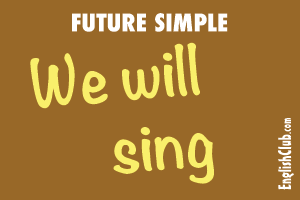Майбутній неозначений час - Future Simple Tense
Future Simple

The Future Simple tense is often called the "will tense" because we make the Future Simple with the modal auxiliary will.
The structure of the Future Simple tense is:
|
subject |
+ |
auxiliary will |
+ |
main verb |
|
|
|
invariable |
|
base |
|
|
|
will |
|
V1 |
For negative sentences in the Future Simple tense, we insert not between the auxiliary verb and main verb. For question sentences, we exchange the subject and auxiliary verb. Look at these example sentences with the Future Simple tense:
|
|
subject |
auxiliary verb |
|
main verb |
|
|
+ |
I |
will |
|
open |
the door. |
|
+ |
You |
will |
|
finish |
before me. |
|
- |
She |
will |
not |
be |
at school tomorrow. |
|
- |
We |
will |
not |
leave |
yet. |
|
? |
Will |
you |
|
arrive |
on time? |
|
? |
Will |
they |
|
want |
dinner? |
We sometimes use shall instead of will, especially for I and we.
Contraction with Future Simple
When we use the Future Simple tense in speaking, we often contract the subject and auxiliary verb:
|
I will |
I'll |
|
you will |
you'll |
|
he will |
he'll |
|
we will |
we'll |
|
they will |
they'll |
In negative sentences, we contract with won't, like this:
|
I will not |
I won't |
|
you will not |
you won't |
|
he will not |
he won't |
|
we will not |
we won't |
|
they will not |
they won't |
We use the Future Simple tense when there is no plan or decision to do something before we speak. We make the decision spontaneously at the time of speaking. Look at these examples:
- Hold on. I'll get a pen.
- We will see what we can do to help you.
- Maybe we'll stay in and watch television tonight.
In these examples, we had no firm plan before speaking. The decision is made at the time of speaking.
We often use the Future Simple tense with the verb to think before it:
- I think I'll go to the gym tomorrow.
- I think I will have a holiday next year.
- I don't think I'll buy that car.
Prediction
We often use the Future Simple tense to make a prediction about the future. Again, there is no firm plan. We are saying what we think will happen. Here are some examples:
- It will rain tomorrow.
- People won't go to Jupiter before the 22nd century.
- Who do you think will get the job?
Be
When the main verb is be, we can use the Future Simple tense even if we have a firm plan or decision before speaking. Examples:
- I'll be in London tomorrow.
- I'm going shopping. I won't be very long.
- Will you be at work tomorrow?
Note that when we have a plan or intention to do something in the future, we usually use other tenses or expressions, such as the present continuous or going to.


про публікацію авторської розробки
Додати розробку
